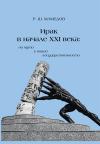Our Political Nature
| Тема: | Многополярный мир |
| Год издания: | 2013 |
| Авторы / под ред. : | Ави Тушман |
Описание
Издательство: Prometheus Books
ISBN 978-1616148232
We are living through an especially divisive moment in history. Our political, social, and economic landscape is increasingly fractured, and a vast chasm seems to separate people on the left from people on the right. Likewise, many Americans are worried and confused about the explosive political upheavals in places like Syria, Egypt, North Korea, and Iran. Time and again, too, our government has been caught flatfooted. We must find a new way to comprehend these problems at a much deeper and more objective level.
There are three questions that are absolutely fundamental to how we understand the future of our country and our world: What are the root causes of our debilitating left-right divide? Where do our political orientations really come from? And how can we predict the eruption of political instability in flash points around the globe? Today’s commentators would have us believe that our political behavior comes from our views about the main issues of the day, such as ObamaCare, or from our economic circumstances, or our longtime affiliations with this political party or that.
This is wrong, or at least incomplete. For the last ten years, I’ve been researching the puzzle of political orientation, both during my career advising heads of state on shaping public opinion and during my doctoral work in evolutionary anthropology at Stanford University. During this inquiry, I’ve drawn together dozens of cutting-edge insights from neuroscience, primatology, and genetics, and they lead to this revealing conclusion: our political orientations are deeply ingrained natural dispositions, molded within each of us by powerful evolutionary forces.
The substantiation for this conclusion comes from some surprising sources. For instance, twins who have been separated at birth and nurtured in very different environments nonetheless grow up to share remarkably similar political attitudes. Likewise, a brain scan can accurately predict whether a person is more likely to be a liberal or a conservative. Contrary to popular belief, our polarizing left-right divide is by no means unique to America; in truth, similar political spectrums run through almost every country. Although they widen under economic stress, their essential structure remains the same. This is why many controversial issues – like gay marriage – invariably polarize political spectrums everywhere in the same way. These spectrums shift slightly to the left or the right depending on the homeland of a population’s ancestors. Even chimpanzees have rudimentary political personalities that are meaningfully similar to ours. What does all of this mean?
Very few of the studies that could help explain these facts have percolated up from their academic journals and into the media. In fact, most findings haven’t even crossed traditional disciplinary borders within the academy. So I was compelled to draw together this diverse research into a single, well-documented explanation of the biological foundations of our most deeply held values. My aim, in sum, has been to paint an illuminating and accurate portrait of our nature as political animals.
As I demonstrate in the book, political orientations across space and time arise from three clusters of measurable personality traits. The three clusters revolve around opposing attitudes toward tribalism, inequality, and differing perceptions of human nature. Taken together, these traits are by far the most powerful cause of left-right voting, even leading people to regularly vote against their economic interests. Our political personalities also shape our choice of a mate and influence societies’ larger reproductive patterns. Perhaps most importantly of all, the book tells the evolutionary stories of these crucial personality traits, which stem from epic biological conflicts.
The underlying science here is complex and often challenging. However, I have gone to great lengths to turn this material into a vivid and entertaining expedition through the worlds of hunter-gatherers, selfish and generous genes, and even viruses. Also, to make the book relevant to a wide range of readers, I’ve used current news stories and personalities to illustrate core concepts. For example, readers will meet Glenn Beck and Hugo Chavez and come to understand the hidden forces they represent.
While this book covers extremely controversial issues, my intention here is not to take sides; it is to illuminate and to push the public debate onto a deeper, more objective plane. Alas, research shows that higher education and higher levels of interest in politics have a polarizing effect on people. This polarization occurs because, as people absorb more and more information about political events, they become increasingly adept at organizing it into coherent ideologies that are typically based on their predispositions. Yet most people haven’t had a chance to step back and contemplate the evolutionary logic of political orientation itself. There is a wonderful phenomenon here: when people do step back, they open themselves to increasing political moderation, deeper understanding, and, ultimately, greater peace of mind.
It is my fervent hope that this book will advance that process. With quieter hearts and deeper understandings, perhaps we can raise the level of our political discourse and strengthen our noble democratic processes.
Прошедший опрос
-
Какие угрозы для окружающей среды, на ваш взгляд, являются наиболее важными для России сегодня? Отметьте не более трех пунктов
Увеличение количества мусора 228 (66.67%) Вырубка лесов 214 (62.57%) Загрязнение воды 186 (54.39%) Загрязнение воздуха 153 (44.74%) Проблема захоронения ядерных отходов 106 (30.99%) Истощение полезных ископаемых 90 (26.32%) Глобальное потепление 83 (24.27%) Сокращение биоразнообразия 77 (22.51%) Звуковое загрязнение 25 (7.31%)

«Международные исследования в России»

Статистические данные по международной проблематике

Электронные журналы и библиотеки



